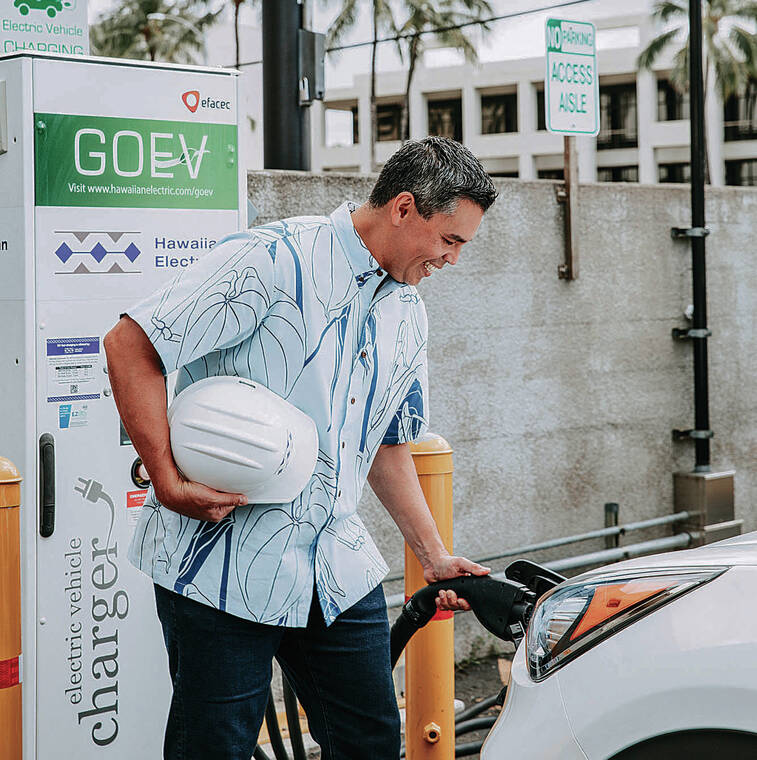Hawaiian Electric proposes more EV public charging stations, lower charging rates

COURTESY HAWAIIAN ELECTRIC
Hawaiian Electric employee Blaine Cacho charges a company EV at one of the two DC fast-charging stations at Hawaiian Electric’s Ward Avenue location.
Citing a steady growth in the number of electric passenger vehicles in Hawaii, Hawaiian Electric announced Monday it is seeking permission from the state Public Utilities Commission to expand its network of public EV charging stations while also reducing charging rates.
In September there were 16,588 EVs registered statewide, including 13,061 on Oahu. That statewide count represents an increase of 3,872 EVs, or 30.4%, from September 2020, according to the state Department of Business, Economic Development and Tourism’s Oct. 6 monthly energy trends highlights Opens in a new tabreport.
However, with a total of 1,054,168 passenger vehicles, including 23,619 hybrid vehicles, registered in Hawaii in September, the EV market still has a lot of room to grow. By providing greater opportunities and incentives through its charging network, the company stated, it aims to help the state achieve its goal of becoming carbon net- negative by 2045.
“Providing drivers with expanded public charging options is critical to serving more electric vehicles on Hawaii’s roadways,” Aki Marceau, Hawaiian Electric’s director of electrification of transportation, said in a statement.
Hawaiian Electric proposes to install and operate some 150 single-port DC fast-charging stations and 150 dual-port Level 2 charging stations at roughly 75 sites from 2023 through 2030.
“This aims to serve about 28 percent of total public fast-charging need in 2030 to catalyze third-party market participation while also serving a critical backbone of reliable charging for our community,” the company announcement said. About 60% of the sites would be on Oahu; 20%, Maui County; and 20%, Hawaii island.
Don't miss out on what's happening!
Stay in touch with breaking news, as it happens, conveniently in your email inbox. It's FREE!
Currently, Hawaiian Electric operates 13 fast-charging stations on Oahu and 25 total across its service territory (Oahu, Maui County and Hawaii island), Alan Yonan, the company’s communications director, said Monday in an email. Prior to the launch of its pilot program, there were no DC fast chargers in Hawaiian Electric’s service territory, he noted.
The company estimates that in 2030 more than 3,600 public charging stations will be needed at workplaces, shopping centers, parks and multiunit dwellings in order that future EV users will have access to dependable charging.
The proposal to the PUC also includes a revised EV charging tariff designed to be roughly cost-competitive with gasoline, and continuing to encourage charging during the middle of the day when solar energy is abundant, the company said, noting the proposed rates are 20% to 46% below the existing rates in Hawaiian Electric’s EV charger pilot program, which has been underway for seven years.
For example, Yonan said, the current midday charging rate at a Hawaiian Electric DC Fast Charger is 49 cents per kilowatt-hour, which, for a Nissan Leaf with a 40 kWh battery, would cost $19.60 for a full charge.
The proposed midday charging rate on Oahu is 26.6 cents per kilowatt-hour, which, for a Nissan Leaf with a 40 kWh battery, would cost $10.64 for a full charge.
The estimated cost of the project is $79 million. Hawaiian Electric said it intends to recover the cost of the proposed project from customers over its seven-year duration but would not make a profit from the chargers.
Instead, “as EV adoption grows, the resulting increase in electricity sales revenue will not result in increased profits for Hawaiian Electric, but will contribute to the recovery of the utility’s fixed costs and, over time, put downward pressure on electricity rates for all customers,” the statement said.
As for where the new chargers might be located, the company said it’s seeking public input and recently received “robust community feedback” through its Charge Up Hawaii interactive web tool, which asks customers what their transportation needs are and where they think EV charging stations are needed. It said it has received 2,045 survey responses and recorded 1,812 pins suggesting future charging sites.
“Hawaiian Electric is committed to taking action on climate change by helping to decarbonize Hawaii’s economy, and electrifying ground transportation is a major part of that effort,” Marceau said.
In 2018 the state passed Act 15, which sets a goal of zero carbon emissions by 2045.
To participate in the survey, go to hawaiianelectric.com/products-and-services/electric-vehicles/we-need-your-input Opens in a new tab.



